ZK Rewind 
The year in recap
We go over the biggest highlights of 2022 for the ZK industry.
As 2022 comes to an end, we wanted to put together a report on the advances in the Zero Knowledge tech space. This has been a busy year for the whole industry but we can confidently say that 2022 has been the breakout year for Zero Knowledge.
Here you can find the sections we covered:
Public Interest 📣
Based on Google Trends data, in 2022 there’s a spike in the interest around the search term Zero Knowledge Proof, which even during the last part of the year, in the middle of a harsh bear market, the interest have kept a rising trajectory.
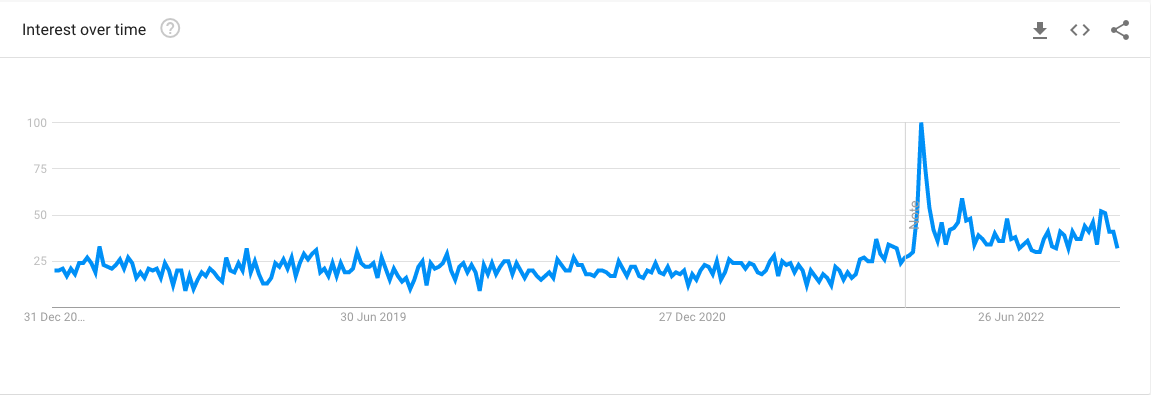
Looking deeper into the data, for example, the keyword “SNARKs” have experienced a 900% growth year-over-year with between 100,000 and 1,000,000 monthly searches worldwide.
Moreover, major blockchain-focused publications such as Decrypt and Coindesk also seemed to be more interested in the Zero Knowledge space in 2022. In the case of Decrypt, during 2021, it only published 18 articles containing the term “Zero Knowledge Proofs” while during 2022 this number jumped to 60 pieces in total. Coindesk was no different, writing 81 articles in 2022, 54 more than in 2021.
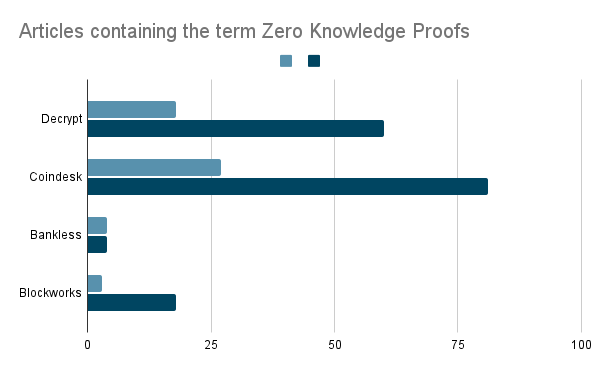
Funding 💰
Investors also jumped on the ZK train. This year, we counted at least over $725M in funding for zero knowledge “pure-players”. Some of the names include Aleo, Aztec, Scroll, RiscZero, Matter Labs, Elusiv and Mina Protocol. The two biggest rounds were Aleo and Matter Labs’ each raising $200M, followed by Aztec’s $100M round.
Besides private equity rounds, some foundations pledged funds to stir the development of ZK applications in their respective ecosystems. Polkadot released the Pioneers Prize initiative with 993,286 DOT in prizes with a special focus on Zero Knowledge tech. Also, the NEAR Foundation started a grants program to support ZK projects in the aftermath of the Tornado Cash incident.
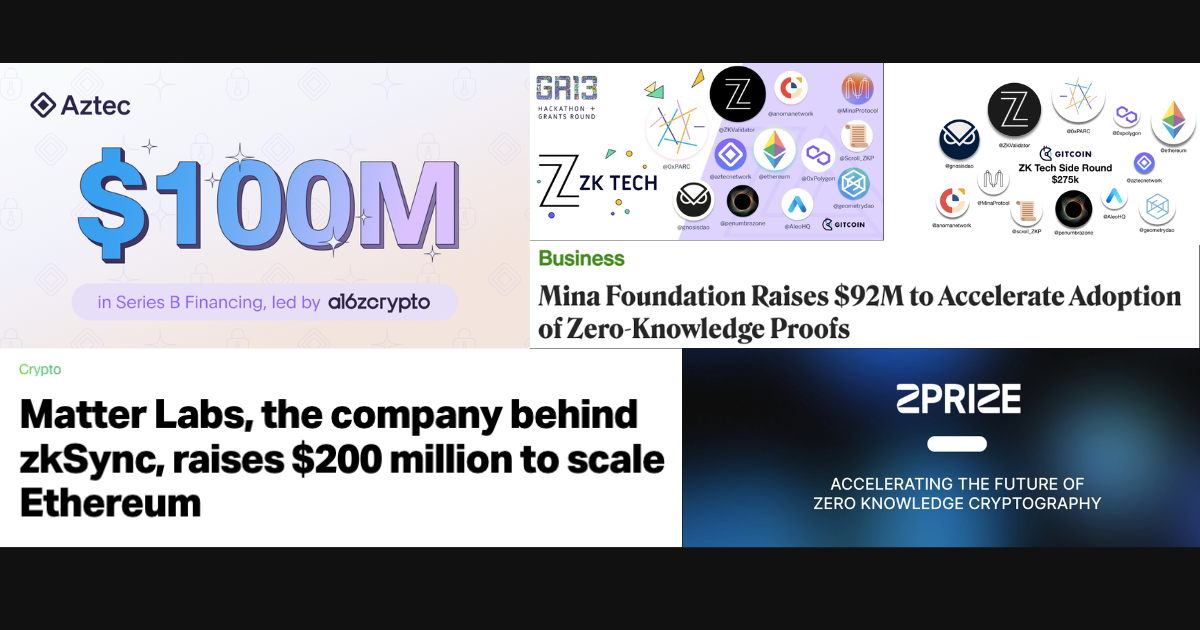
At the same time, a coalition of zero knowledge projects and organisations such as ZKV, put together the ZPrize initiative, which had $7M in prizes. The competitions were challenges aligned with the goal of pushing forward ZK tech in various areas such as the performance of key general algorithms, the availability and diversity of libraries, etc.
This year, there were three Gitcoin ZK Side Rounds with $466,000 in matching funds in total. Across all rounds, different public good projects raised close to $1M. These side rounds were primarily focused on improving the usability or the tooling as well as creating new applications to onboard users to the ZK space. Several teams participated in this initiative including ZKV, 0xParc, Gnosis, Anoma, Penumbra, Mina, Geometry, Aztec, and many others.
The year of the zk(E)VM 🤖
Although there were many breakthroughs, the buzzwords of the year were perhaps Zero Knowledge Virtual Machine (zkVM) and Zero Knowledge Ethereum Virtual Machine (, zkEVM). Many projects are building some variation on these as they are seen as a highly viable scalability solution for the Ethereum blockchain.
During EthCC event in Paris this past summer, there were a slew of announcements around these solutions from various teams.
During that event, Polygon unveiled their zkEVM. Polygon’s zkEVM, in contrast with traditional zk rollups, aims for op-code compatibility with the Ethereum Virtual Machine and offer faster and cheaper transactions. After the announcement in July, there have been several updates, the latest news is that the final public testnet has been released on December 21st.
On the other hand, zkSync, who also announced at EthCC, pushed their zkVM, zkSync 2.0, to mainnet in October. While they initially shipped a very stripped down version of what is to come, zkSync 2.0 will offer some main differentiators such as account abstraction, support for Solidity and Vyper, and an LLVM compiler.
More players also came out. One of the most prominent public announcements was RiscZero building a “general purpose zero-knowledge VM”. Also, Scroll, which is building a zkEVM-based zkRollup on Ethereum, launched its pre-Alpha testnet with limited demo features (and also announced during EthCC!).
Testnets are getting FAST ⏩
As Zero Knowledge tech spreads through the blockchain industry, three promising players gave significant steps towards mainnet.
In the final quarter of the year, Aleo made significant improvements and launched their Testnet 3, which was divided into three phases. This version allowed developers to to start writing, deploying, and executing Aleo programs on the network. Also, it introduced a new consensus algorithm, AleoBFT, which combines a proof-of-stake consensus algorithm (based on DiemBFT) with a work-based compensation scheme for provers.
TESTNET 3 UPDATE:
— Aleo (@AleoHQ) December 4, 2022
🖥️14,000 Nodes
⚡20m Proofs Per Second (1000x higher than Testnet2)
Big things are coming for Aleo🙌
Another player that advanced on their testnet was Namada, a fractal instance of Anoma, bringing shielded assets to the Cosmos ecosystem. They ran a private testnet, in which ZKV was part of the validators, and launched their first public testnet on December 20th.
Last but not least, we have also been following the development of Penumbra, Cosmos’ shielded Decentralised Exchange (DEX). Over the course of 2022, following their fast release philosophy, Penumbra launched 35 public testnets. Along the road, the team introduced important improvements such as the novel Tiered Commitment Tree, a Merkle Tree supposed to speed up Penumbra by 4,000x, and Poseidon377, their instantiation of the Poseidon ZKP-friendly hash for the Penumbra system.
Bridging with ZK 🌉
Even though they are in a very early phase, a group of projects have been gaining ground in the ZK space. We are referring to the ZK Bridges – solutions for trustless cross-chain bridging. These are meant to replace other bridge architectures that were one of the main security issues in 2022.
In October 2022, Succinct launched its first demo. This version bridged Goerli (an Ethereum testnet) and Gnosis Chain to allow users to deposit “Succinct Tokens” (an ERC-20 we created) to a Goerli deposit contract and receive minted Succinct tokens on Gnosis Chain. Also in October, zkBridge published its paper for the solution they are building at Stanford.
Another novel concept along these lines is the birth of zkIBC. This solution aims to bring Cosmos’ signature Inter Blockchain Communication Protocol to Ethereum using Zero Knowledge Proofs. Basically, they started building a trust-minimised, interoperable messaging protocol based on zk-snark proofs verification of light client state on Ethereum.
New languages are a thing 🈹
Two new languages were made public in the context of Zero Knowledge projects. In early 2022, Aleo presented LEO; a Rust-inspired statically typed programming language built for writing private applications. Meanwhile, in October, Aztec released their Noir language. Noir is a Rust-based domain specific language (DSL) for creating and verifying zero-knowledge proofs.
Ceremonies took the stage 🎊
Trusted Setup Ceremonies were also part of the narrative near the end of the year. For starters, a TSC is a process by which a group of participants will collaboratively generate a set of cryptographic parameters that must then be used every time some cryptographic protocol is run. The projects running such processes were Namada and Manta. For the first, a total of 2510 people joined the ceremony while for the latter, over 3559 contributors took part in the process. The Ethereum foundation is said to be planning a trusted setup for early 2023 as well.
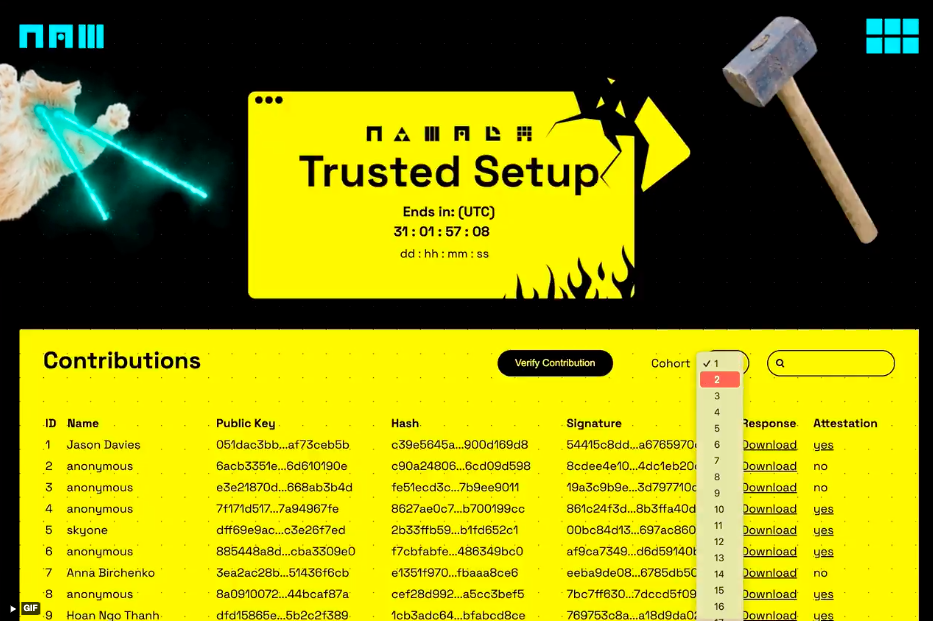
From Apps to zkApps📱
In mid November, Mina Protocol launched a program aiming to boost the development of the so-called zkApps, smart contracts that allow developers to leverage Mina’s zero knowledge technology. This marks an important milestone for the ZK space since it will probably unleash a massive wave of innovation and use-cases using Zero Knowledge as well as probably the onboarding of some of the over 83,000 Typescript developers thanks to the SnarkyJS library used to build the zkApps.
Community is getting bigger
As the adoption of Zero Knowledge increases, the number of people interested in this technology has increased substantially. Two of the landmark events of the community, ZK Hack and the zkSummit brought together over 2500 people combined over the two editions of both events. A highlight throughout these events was the merging of multiple ecosystems and the chance for folks new to the ecosystem to connect with key projects.
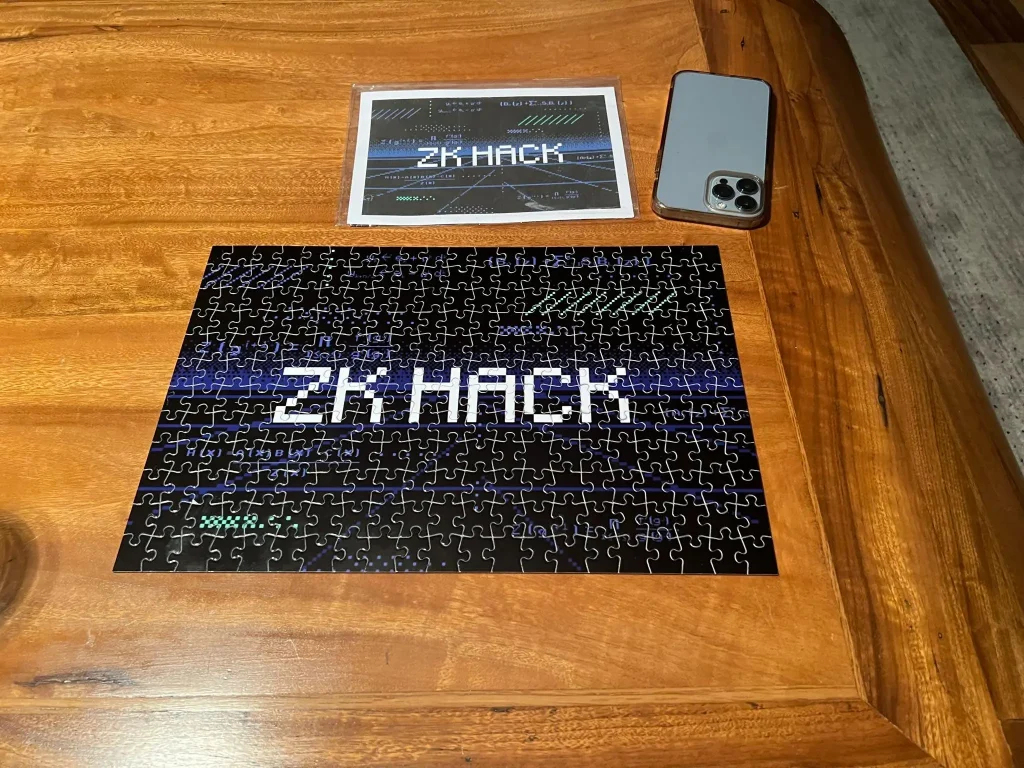
Research matters 🧪
Thinking Zero Knowledge is constrained to the blockchain industry is an error. General research is on the rise. There has been a considerable number of papers published by Academia around the topic. According to Google Scholar, in 2022 alone, there were 67,100 articles published covering the topic of Zero Knowledge research, 2,000 more than in 2021. However, the number of papers in this context has considerably dropped since 2018.
Conclusion
So that wraps up our wrap up of the year! And although the majority of the narrative is centred around scalability this past year, we hope that in the coming months we could see a wave of privacy-focused protocols using Zero Knowledge.
2022 was the breakout year for Zero Knowledge: ZK tech went from research to real world implementations in the blockchain industry and beyond. We see this as a start to something even bigger.
